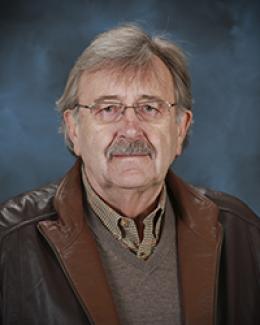
George M Stocks
Corporate Fellow Emeritus and Distinguished Research Staff
Bio
Dr. G. Malcolm Stocks is a Corporate Fellow Emeritus and served as the Group Leader of the Materials Theory Group since its inception in 2006 and previously led a theory group in the former Metals and Ceramics Division. His major research activities are in development and application of first principles electronic structure methods (particularly those based on multiple scattering Green's function methods), the theory of magnetism, alloy theory, semiconductor-oxide interfaces, and the application of parallel algorithms and computers to extend the size and complexity of systems amenable to treatment by first principles methods. His current research is focused on the theory of equilibrium and non-equilibrium properties of inhomogeneous itinerant magnets, magnetic nano-structures, the development of massively parallel methods for performing large scale first principles (LDA) calculations [in particular the order-N Locally Selfconsistent Multiple Scattering (LSMS) method] and their application to problems in magnetism, disordered alloys, and bulk amorphous metals. Other interests include the first principles theory of the electronic structure and energetics of substitutionally disordered systems [in particular the Korringa-Kohn-Rostoker Coherent-Potential Approximation (KKR_CPA) method], ordering mechanisms in alloys, and alloy phase stability.
Professional Experience
- 2006-present Group Leader, Materials Theory Group, MST Division, ORNL
- 1995-Present Corporate Fellow, ORNL
- 2001-2006 Group Leader, Theory Group, M&C Division, ORNL
- 1976-1995 Research Staff, Metals and Ceramics Division, ORNL
- 1972-1976 Research Associate, Department of Physics, University of Bristol, UK
- 1969-1972 Post Doctoral Fellow, Metal and Ceramics Division, ORNL
- 1987-1988 Visiting Fellow, Department of Physics, University of Bristol, UK
- 1987-1988 CCP9 Senior Visiting Fellow, SERC, Daresbury Laboratory, UK
Awards
Gordon Bell Prize (2001) Special Honorable Mention;
Computerworld Smithsonian Laureate (2000);
Gordon Bell Prize (1998);
ORNL Corporate Fellow (1995),
Martin Marietta Energy Systems Award: Operations and Support (1992);
Martin Marietta Energy Systems Award: Technical Achievement (1986);
Gordon Bell Prize (1990);
Cray Research Giga-flop Award (1990);
US-DOE Division of Materials Sciences Awards - Outstanding Sustained Research in Metallurgy and Ceramics (1989);
US-DOE Division of Materials Sciences Awards - Outstanding Sustained Research in Metallurgy and Ceramics (Theory Group, 1983);
Science Research Council (UK), Fellowship (1972).
Service: Member at Large: APS Division of Computational Physics (2003-2006);
Member: NERSC Users Group (NUG) Executive Board (1999-2004);
Chairman: ORNL Corporate Fellows Council (2003-2005);
Chair: Committee on Alloy Phases, TMS (1997-2000);
Board Member: Electronic Magnetic and Photonic Materials Division of TMS (1997-2000);
Board Member: TMS Structural Materials Division of TMS (1997-2000);
Editorial Board: The International Journal of High Performance Computing Applications (1994-2001).
Advisory Boards: Materials Research Science and Engineering Center (MRSEC) “Quantum Spin Phenomena in Nanomagnetic Structures (QSPIN)”, U. of Nebraska, (2002-Present);
Plasma Science Advanced Computing Institute (1999-Present);
Computational Materials Science Network (CMSN) (2002-2004);
Center for Nanophase Materials Science (CNMS), ORNL, (2002-2005);
Collaborative Computational Project IX, Science Research Council (UK), (1978-1988).
Education
- University of Bradford, UK., B.Tech. 1966, Applied Physics (First Class Honours)
- University of Sheffield, UK., Ph.D., 1969, Theoretical Physics
Professional Affiliations
APS (Fellow), TMS (Member), MRS (Member)

